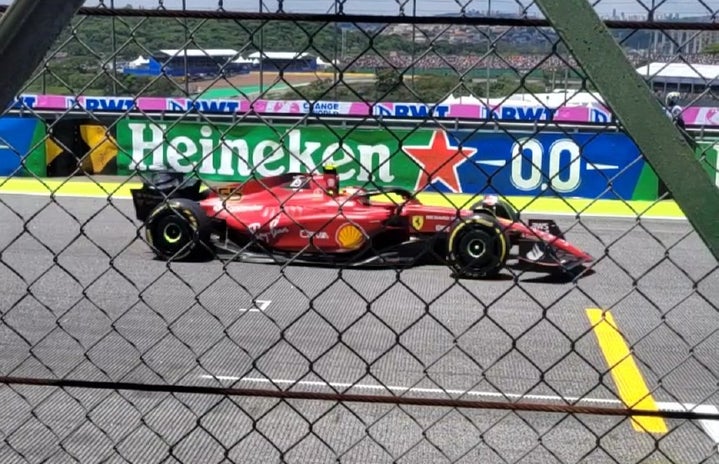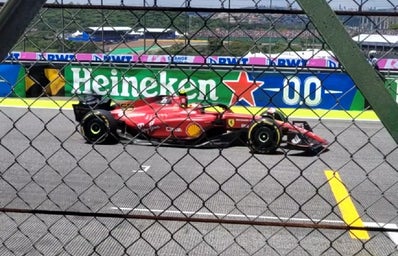Being a woman who works in sports nowadays can be challenging. However, they fight every day for the right to be treated with respect and honor.
In the past few days, everyone who follows Formula One has been seeing, more than ever, how hard it is to be a woman in the paddock. It has come out to the world that even when a woman is a victim of sexual harassment in that environment, they are blackmailed into silence. Even worse, some men say that addressing it causes ‘noise and distraction’ from the races.
Fortunately, women did not take these speeches into account and continued their values of supporting other women in sports, showing that the motorsport environment can and should be the place for any woman who wants to pursue a career in this field. Therefore, here are three Brazilian motorsport journalists that you should know about.
NATHALIA DE VIVO
Being a journalist was not her first choice for a degree when she was in high school; initially, she dreamed of becoming a veterinarian. However, everything changed when her teacher recognized her writing talent and suggested that journalism would be a great fit. Since then, she has not been able to imagine herself doing anything else.
Feeling uncertain about which career path to pursue is common. Nathalia herself had considered exploring fashion and surfing before entering the world of motorsports. “As it turned out, life had other plans for me. I interviewed for a position at iG Automobilismo, was accepted, and decided to give it a try. It was the best decision of my life!”
Although she already had her father’s influence in liking Formula 1, her passion for motorsport in general started when she began her first job. “I admit I didn’t follow much, just the basics, and knew the main drivers, but that’s it. After I started delving deeper, I dove in headfirst.”
Nowadays, Nathi is the editor of F1Mania and has an independent channel on YouTube named “Elas na pista”. She oversees all the coverage of Stock Car – the biggest Brazilian category in motorsport – and the Porsche Cup.
She explained how her workdays function, which varies depending on whether she is at home or on the tracks. At home, she explained that she watches all the sessions, searches everything about the subject, and organizes everything to write the text, ensuring to not forget any details. But when she is at the racetracks, it is all chaos. “When I go to the racetracks, it’s crazy, I have to find time to write the texts, watch the practices and races, talk to the drivers, think about topics. But I love it!”
As a woman who is present at paddocks of so many different categories of motorsport, she knows that it happens with girls who feel uncomfortable there, but the important thing is understanding that every woman has the right to be there as much as any man. “Many times, they will make you doubt, they will make you think it’s not your place, that you don’t deserve to speak and do what you do, but don’t give up, never. And the main thing is to have fun and be yourself, that’s what will make you stand out and earn your place. And again, you deserve to be there, never let anyone make you believe otherwise!”
ISABELLA AYAMI
For someone who grew up around sports the entire time, it was natural to end up working with sports as well. “I played volleyball from the age of seven until seventeen. I was in a federation for eight years. So, sports have always been very important to me, and it has always been my life. When it came time for the third year of high school, you started thinking about college, and I didn’t want to leave sports behind.”
When you go up to a class of journalists and ask why they have chosen this career, a lot of them will say that it was because they have always been communicative, and for Isabella, this was no different. So, she saw a perfect opportunity to mix two things that she is good at communicating and sports. “Therefore, I studied journalism thinking about sports. My focus was to enter journalism and start in sports reporting.”
Her career started when she did an internship at Band Internacional – which is a channel of Band that only broadcasts content to people outside the country – 7 years ago as social media manager. She only got into sports when a digital department was created, like BandSports, and she started working in digital. Nowadays, Isabella continues in the company showing some of the behind-the-scenes, doing some coverages of motorsports, and participating in and presenting some programs on the channel.
In 2020, when Band bought the rights to Formula 1 in Brazil, it was shocking news for everyone at the corporation. However, she knew that, when one of the biggest growing sports comes to the channel that you’re at, you will need to get up close to that, and it was something natural for her. “My dad has always been a big fan of Formula 1. I say he has always liked F1 more than football, more than his team. So, I’ve been very used to watching races at home since I was little.”
Being at the paddock of any category of motorsport for the first time is always exciting and a nervous feeling for anyone. The chance to meet drivers that you have seen on TV at several points in your life is an unforgettable moment. “The first time was the final of the Stock Car championship two years ago. It was a very different sensation, being there, inside, being able to talk to drivers, like Rubens Barrichello who races in the Stock Car, he’s someone you admire, and suddenly you’re there interviewing him. I was quite anxious. It was the first time, so everything didn’t come out perfectly, but it got better afterward.”
As much as this sport can be the dream work for many women, it can also be stressful and disheartening with all the male dominance and prejudice that girls can feel at the paddock. “We are always the minority, so when we arrive, there are three girls, and it seems like you are there either because you are someone’s girlfriend or because you want to be in the spotlight. But no, we want to cover the sport normally, we want to talk about the sport, not just about driver X or driver Y. We are not there just to get attention.”
MARIANA BECKER
The last, but not least, probably one of the biggest inspirations for Brazilian girls who want to work as a journalist in Formula 1 is Mariana Becker.
Mari was a girl who always enjoyed sports. When she was little, she used to go surfing and travel by herself, which allowed her to meet many people. When she returned home, she would write down everything that happened to her or what she saw during the day. Combining her love for surfing and writing, during her adolescence, she began attending surf championships to write and produce bulletins for a radio station. Her passion for writing naturally led her to pursue a career in journalism.
She always liked sports – soccer, volleyball, Formula 1 and so many others – but she was never a huge fan who would go out to a game, and search for all the details. However, she had to learn everything to become one of the biggest female names in sports journalism.
Even though she used to watch Formula 1 with her father growing up, motorsport entered her life with Rally dos Sertões. In the Years 2000, 2002, and 2003 Mari ran the competition as a copilot. “I thought motorsport didn’t show all the excitement it had, and I also wanted to understand more because I watched motorsport, but I watched it from the outside, there weren’t many cameras. So, I saw it from the outside, the helmet, I didn’t see much of the emotional aspect of the story.” She said on her Instagram page.
And it was in 2007 that Mariana would travel for the first time to do coverage of a Grand Prix, Nürburgring. It was the very first time that Globo – the former channel where she worked – gave a woman this function. “And Globo wanted to see if the bet of putting me as an F1 reporter would work out.” Mariana wrote in her book “Não inventa, Mariana”.
As a reporter, Mariana’s day is always chaos at the racetracks, getting all the details about the Grand Prix, all the information that goes around the paddock, watching all the sessions, and interviewing drivers. It can be tiring. “At the end of the day, I was all disheveled, crumpled, thirsty, and hungry. I would still satisfy my hunger and thirst while still wearing my uniform and credential.” Mariana said in her book.
Therefore, Mariana is seen as a role model to girls who want to pursue motorsport. Going to all the Grand Prixs´ around the world, getting to know the drivers mutinously, being near to the sound and smells of the cars. That is a dream for many girls in this career. And she does that with mastery, showing everyone that women can work in any space in motorsport and be respected for that.
————————–
The article above was edited by Julia Tortoriello.
Liked this type of content? Check Her Campus Cásper Líbero home page for more!


